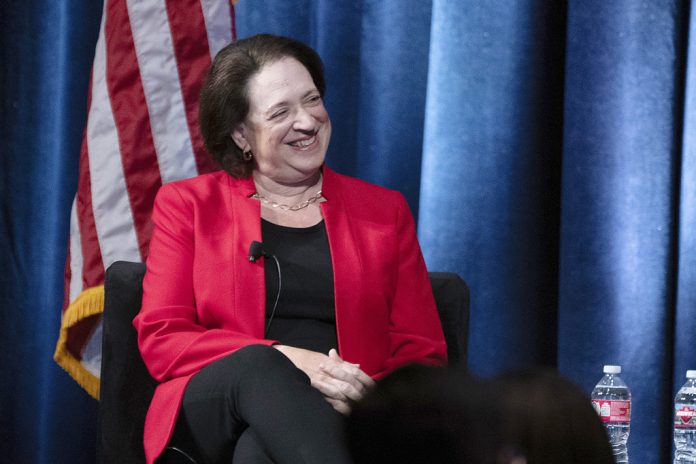SACRAMENTO, Calif. (AP) — Justice Elena Kagan on Thursday became the first member of the U.S. Supreme Court to call publicly for beefing up its new ethics code by adding a way to enforce it.
In her first public remarks since the nation’s highest court wrapped up its term earlier this month, Kagan said she wouldn’t have signed onto the new rules if she didn’t believe they were good. But having good rules is not enough, she said.
“The thing that can be criticized is, you know, rules usually have enforcement mechanisms attached to them, and this one — this set of rules — does not,” Kagan said at an annual judicial conference held by the 9th Circuit. More than 150 judges, attorneys, court personnel and others attended.
It would be difficult to figure out who should enforce the ethics code, though it should probably be other judges, the liberal justice said, adding that another difficult question is what should happen if the rules are broken. Kagan proposed that Chief Justice John Roberts could appoint a committee of respected judges to enforce the rules.
Democrats, including President Joe Biden, have renewed talk of Supreme Court reforms, including possible term limits and an ethics code enforceable by law.
The court had been considering adopting an ethics code for several years, but the effort took on added urgency after ProPublica reported last year that Justice Clarence Thomas did not disclose luxury trips he accepted from a major Republican donor. ProPublica also reported on an undisclosed trip to Alaska taken by Justice Samuel Alito, and The Associated Press published stories on both liberal and conservative justices engaging in partisan activity.
Earlier this year, Alito was again criticized after The New York Times reported that an upside-down American flag, a symbol associated with former President Donald Trump’s false claims of election fraud, was displayed outside his home. Alito said he had no involvement in the flag being flown upside down.
Public confidence in the court has slipped sharply in recent years. In June, a survey for The Associated Press-NORC Center for Public Affairs Research found that 4 in 10 U.S. adults have hardly any confidence in the justices and 70% believe they are more likely to be guided by their own ideology rather than serving as neutral arbiters.
Kagan, who was nominated to the Supreme Court in 2010 by then-President Barack Obama, said Thursday that having a way to enforce the ethics code would also protect justices if they are wrongly accused of misconduct.
“Both in terms of enforcing the rules against people who have violated them but also in protecting people who haven’t violated them — I think a system like that would make sense,” she said.
The Supreme Court ruled on a range of contentious issues this term, from homelessness to abortion access to presidential immunity. Kagan was in the minority as she opposed decisions to clear the way for states to enforce homeless encampment bans and make former presidents broadly immune from criminal prosecution of official acts. Kagan joined with the court’s eight other justices in preserving access to mifepristone, an abortion medication.
Kagan has spoken in the past about how the court is losing trust in the eyes of the public. She said after the court overturned Roe v. Wade in 2022 that judges could lose legitimacy if they’re seen as “an extension of the political process or when they’re imposing their own personal preferences.”
___
Associated Press writer Mark Sherman in Washington contributed to this report.
___
Austin is a corps member for The Associated Press/Report for America Statehouse News Initiative. Report for America is a nonprofit national service program that places journalists in local newsrooms to report on undercovered issues. Follow Austin on X: @sophieadanna
Source: post





